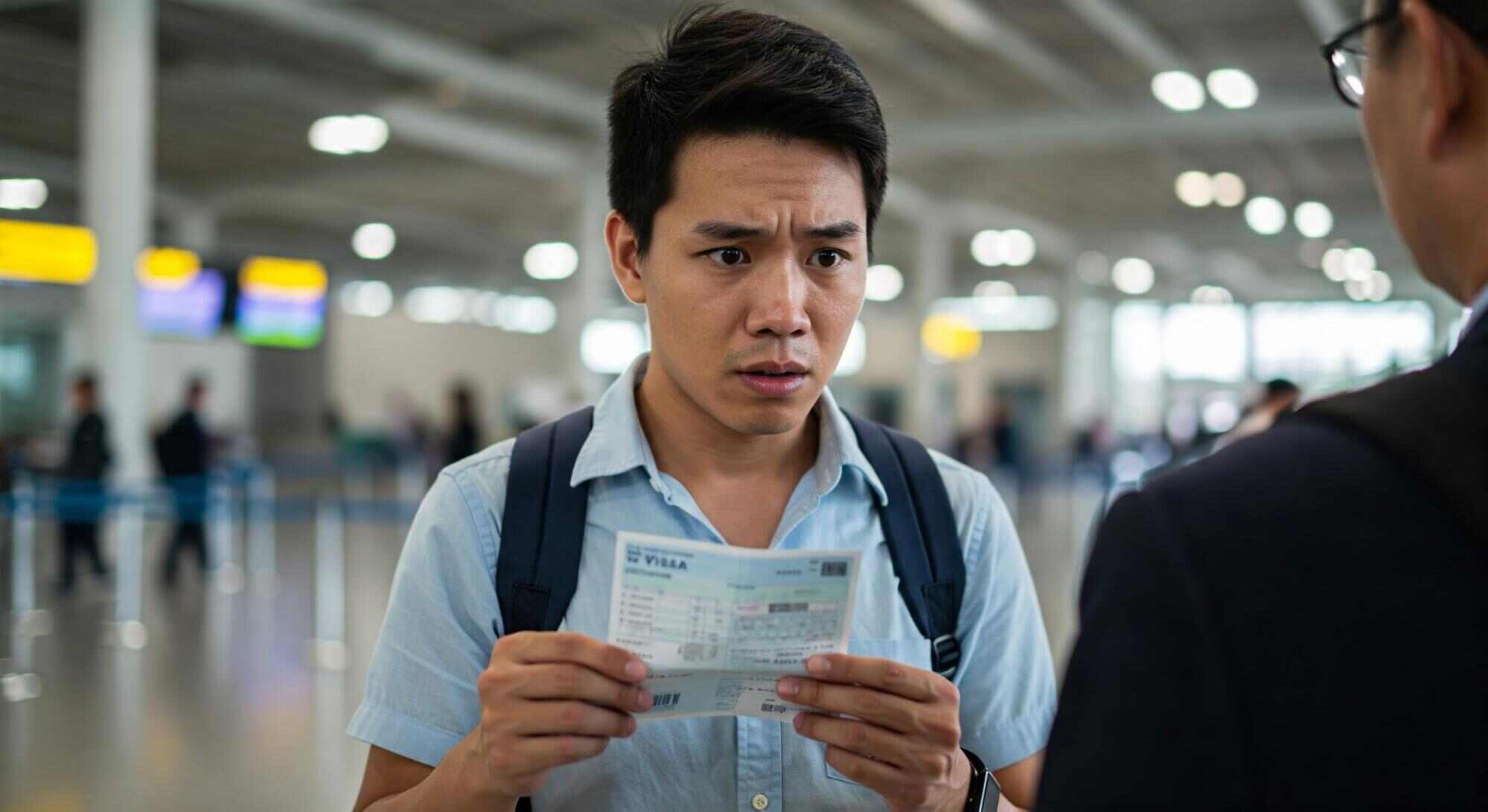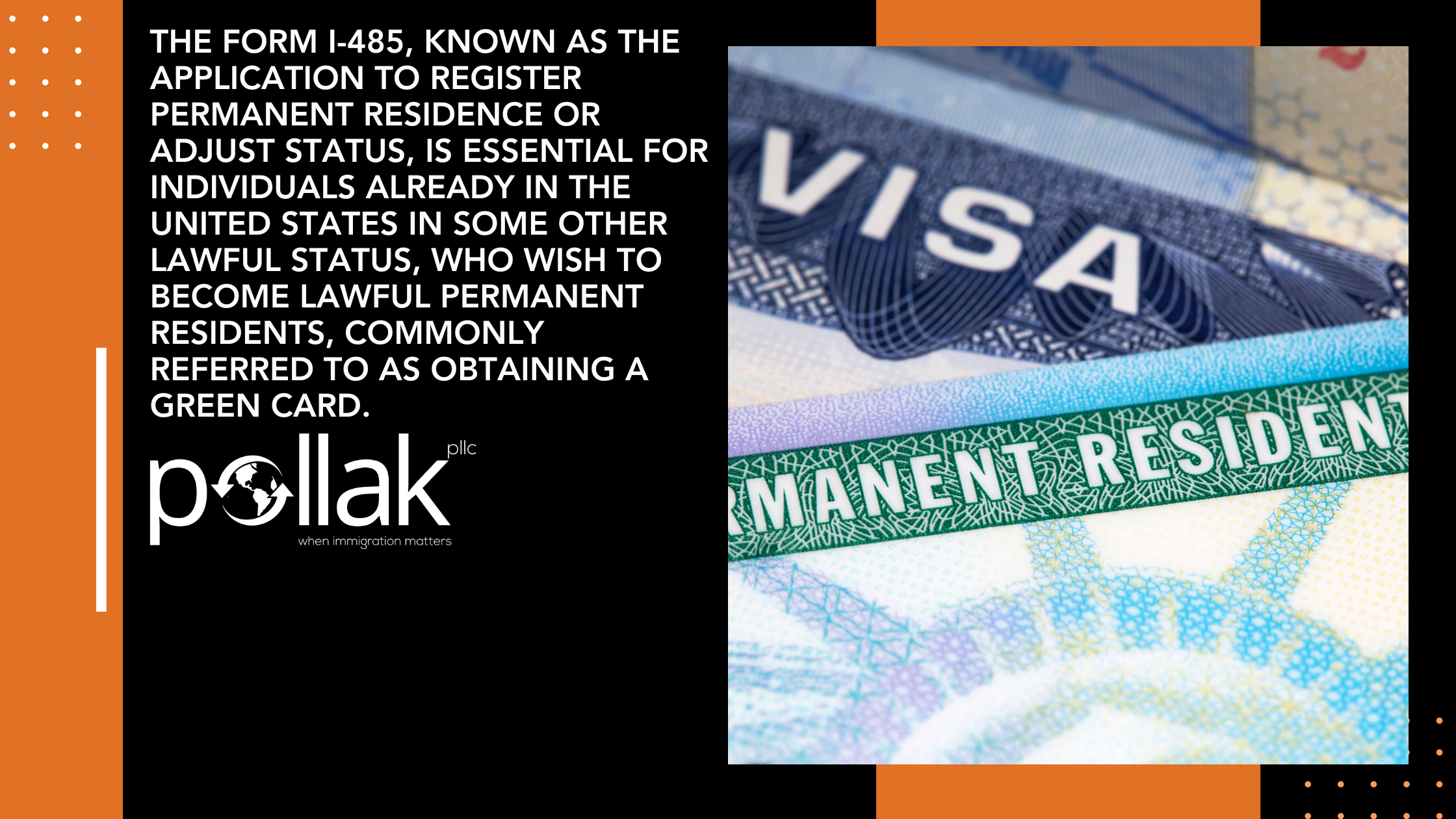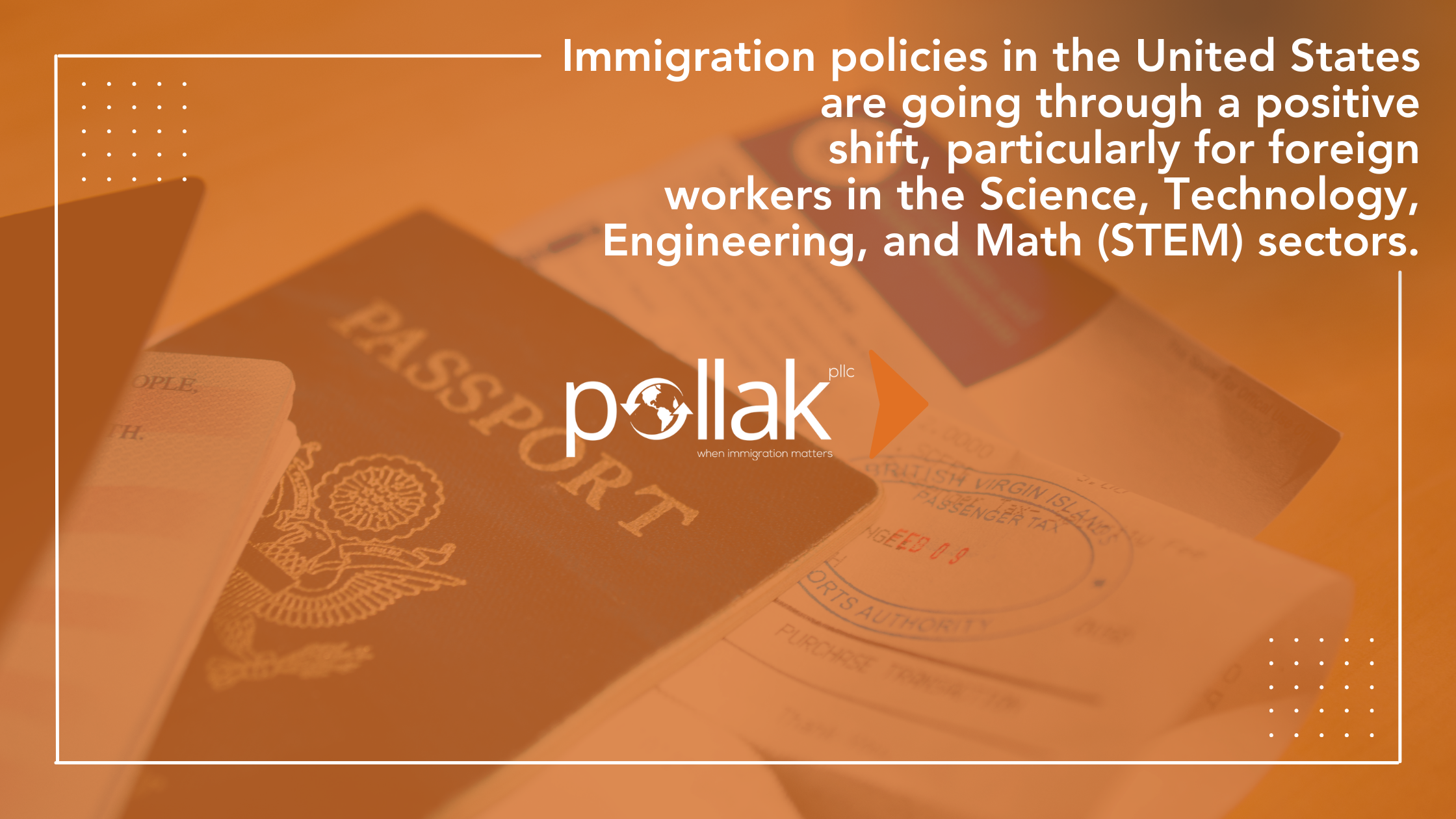Having your visa canceled without warning can be a jarring experience. You may have arrived at the airport or consulate expecting to continue your journey, only to be told that your visa has been canceled due to a clerical error. You're left confused, uncertain, and likely anxious about what this means for your ability to stay in or return to the United States.
When a visa is marked as "CWOP" or "Canceled Without Prejudice," it can feel like everything is unraveling. But in many cases, this designation does not mean you've done anything wrong—and it doesn't necessarily spell the end of your immigration plans. With the right legal support and prompt action, it's often possible to recover from a CWOP and move forward confidently.
What Makes Pollak PLLC Different?
Navigating the immigration system can be overwhelming, especially when something unexpected like a CWOP stamp occurs. Choosing the right legal partner is essential.
Hands-On Legal Guidance
At Pollak PLLC, your case isn't handed off to junior staff. You'll work directly with Managing Attorney Karen-Lee Pollak, whose strategic oversight ensures that every detail is reviewed and every action is aligned with your best interest.
Decades of Focused Immigration Experience
With over 27 years of exclusive experience in U.S. immigration law, Pollak PLLC immigration lawyers have helped thousands of individuals, families, and businesses find effective legal solutions—even in complex or time-sensitive situations like a visa cancellation.
Transparent and Responsive Service
From the first consultation to the resolution of your matter, our firm provides honest communication and regular updates. You'll always know where your case stands and what comes next.
Custom Strategies for Complex Cases
No two immigration stories are the same. Whether your CWOP stems from a clerical error or deeper issues within your immigration history, Pollak PLLC develops a legal plan tailored to your background and goals.
Understanding CWOP: What It Means and Why It Happens
Receiving a visa marked as "Canceled Without Prejudice" (CWOP) can feel like a major setback. While the stamp may spark anxiety and confusion, it's important to recognize that CWOP is fundamentally different from a visa denial or revocation. In many cases, it reflects an administrative issue rather than a reflection on your character, eligibility, or actions.
What CWOP Really Means
CWOP is an acronym for "Canceled Without Prejudice." When this label appears on your visa, it indicates that the visa has been voided, but not for any punitive reason. The phrase "without prejudice" is a legal term meaning the cancellation does not carry negative implications for your future immigration filings. Unlike revocations, CWOP is not an accusation of misconduct.
Consular officers or Customs and Border Protection (CBP) agents typically issue a CWOP when there is a discrepancy or irregularity—something that, while requiring cancellation of the current visa, does not suggest any wrongdoing.
Why Visas Are Canceled Without Prejudice
There are several common reasons why a visa may be CWOPed. Most are clerical or procedural:
- Typographical errors in the printed visa
- Duplicate entries for the same individual in the system
- Incorrect visa classifications or mismatched supporting documentation
- System updates or changes requiring a new visa issuance
Often, the issue is identified by an officer during a routine check, and the solution is to cancel the flawed visa and advise the traveler to apply for a corrected one. While frustrating, the goal is to ensure that all visa records are accurate and consistent with U.S. immigration law and Department of State requirements.
How CWOP Differs from Visa Revocation
It's essential to distinguish between CWOP and visa revocation. A revoked visa generally involves allegations of misrepresentation, violation of visa terms, or security concerns. Revocations often have serious consequences, including inadmissibility to the United States and possible bars to future entry.
CWOP, by contrast, is not punitive. It acknowledges that the visa cannot be used in its current form but does not suggest the applicant has done anything wrong. In fact, many individuals successfully obtain a new visa shortly after receiving a CWOP, especially when they act quickly and engage legal guidance.
Understanding the context behind a CWOP helps reduce fear and allows for a clear, strategic response. With informed legal support, a canceled visa can often be replaced with minimal disruption to your immigration goals.
Immediate Steps to Take After Receiving a CWOP Stamp
Learning that your visa has been marked as CWOP can be unsettling. Whether you were stopped at a port of entry or received the news from a consular officer abroad, knowing how to respond in those initial hours and days is crucial. Acting promptly and methodically can preserve your eligibility for future immigration benefits and limit disruptions to your plans.
Speak with an Immigration Attorney Immediately
Do not attempt to navigate the implications of a CWOP on your own. Consult an immigration attorney with experience handling canceled visa cases. At this stage, a professional legal review is more than helpful—it's essential. An attorney can review your immigration history, identify what triggered the cancellation, and advise on your options with clarity and urgency.
Request Specifics About the Cancellation
Ask for written or verbal confirmation explaining why your visa was canceled. This could include a note from the consular officer, a CBP referral slip, or annotations on your travel documents. Understanding the specific grounds for the CWOP helps guide what steps should be taken next. Even if the explanation seems vague or procedural, any documentation is better than none.
Secure and Organize All Documentation
Compile and preserve every relevant piece of paperwork. This includes your passport with the CWOP stamp, previous visa(s), Form DS-160 confirmation page, SEVIS records, I-20 (if applicable), and any communications from the embassy or consulate. Organizing this information into a timeline can help your legal team identify patterns or issues that may impact a future visa application.
Clarify Your Immigration Status
Understanding whether you are permitted to remain in the United States—or whether you are now considered inadmissible—is a critical question. In some cases, a CWOP issued at a U.S. port of entry may result in immediate denial of admission and a required departure. In others, if the visa was canceled while you were abroad, it may simply mean that a new application is required before you can reenter.
Determine the Best Next Step
After reviewing your documents and immigration history, your attorney can help determine whether you should reapply for the same visa, consider a different visa category, or take steps to adjust your status through another pathway. Timing, accuracy, and strategic planning all matter—and addressing these early increases your likelihood of success.
Pollak PLLC regularly advises individuals in these situations and offers a measured, knowledgeable approach that prioritizes your long-term immigration goals.
Reapplying After a CWOP: Legal Considerations and Strategy
Being told to reapply for a visa can be frustrating—especially if you've already invested time and resources in the process. However, the "without prejudice" designation means you have the opportunity to submit a new application without the prior cancellation being used against you.
Building a Strong Reapplication
While a CWOP does not imply wrongdoing, consular officers will still review your new application closely. Pollak PLLC helps you:
- Clarify inconsistencies or clerical issues from the prior application
- Prepare updated and complete documentation
- Draft cover letters or attorney memos to explain the CWOP history
Assessing Risks and Opportunities
Your ability to obtain a new visa may depend on your prior compliance with U.S. immigration laws. Any overstay, unauthorized work, or misrepresentation can complicate reapplication. Our firm reviews your full immigration history to identify risks and prepare mitigation strategies.
Custom-Tailored Legal Guidance
Pollak PLLC doesn't take a one-size-fits-all approach. Whether you're seeking a new tourist visa, student visa, or employment-based visa, we'll advise you on the best path forward and help you refile quickly and effectively.
Visa Options If CWOP Prevents Reentry
If a CWOP occurs while you're outside the U.S. and you're unable to return immediately, you may need to explore alternative visa categories or avenues for reentry.
Consider Alternate Visa Types
Depending on your goals, eligibility, and ties to the U.S., you may qualify for:
- B-2 (Tourist/Visitor Visa)
- F-1 (Student Visa)
- H-1B visa or other employment-based visas
- L-1 (Intra-company Transfer)
- O-1 (Extraordinary Ability Visa)
Strategic Visa Selection
Your future plans—whether returning to school, resuming work, or visiting family—should guide your choice of visa. Pollak PLLC helps assess your eligibility for each option and prepares applications that align with your long-term immigration strategy.
Risks and Pitfalls: What to Avoid When Reapplying
Receiving a CWOP designation can be stressful, but it's how you respond that often determines the outcome of your next steps. While CWOP is not punitive, it introduces a critical window of time in which even small errors can lead to significant setbacks. Avoiding common pitfalls is essential to preserving your eligibility and minimizing disruption.
Acting Too Slowly
One of the most frequent—and costly—mistakes is hesitating to act. A CWOP should prompt swift review and reapplication, not prolonged uncertainty. Delaying your response can reduce your legal options, lead to gaps in status, or even risk an overstay. Prompt consultation with an immigration attorney ensures you're not missing important filing windows or procedural requirements.
Many applicants assume they have ample time or mistakenly believe the situation will resolve on its own. In reality, the longer you wait, the fewer pathways remain available. Acting quickly protects your record and preserves valuable immigration options.
Submitting Weak or Contradictory Applications
When reapplying after a CWOP, clarity and consistency are key. Incomplete or inconsistent applications signal carelessness or confusion—both of which can undermine your credibility with U.S. immigration officials. It's not just about reapplying quickly; it's about doing so correctly.
Documentation must be complete, your story must be coherent, and any previous discrepancies should be clearly and professionally addressed. Pollak PLLC ensures every application is accurate, properly supported, and backed by a sound legal strategy.
Misinterpreting What CWOP Does and Doesn't Mean
Although the term "without prejudice" suggests leniency, it doesn't provide immunity. A CWOP won't count against you solely on its own, but that doesn't mean your new application will be approved automatically. You must still meet all eligibility requirements and demonstrate that your circumstances align with the visa category you're applying for.
If your immigration history includes overstays, unauthorized employment, or misrepresentation, those elements may still influence your case. Legal guidance helps clarify which aspects of your history matter and how to address them proactively.
Overlooking Practical Implications on Travel and Status
A CWOP can create significant confusion about your current immigration status and your ability to travel. If you're in the United States on another valid visa, you may wonder whether the cancellation affects your right to remain. If you're abroad, travel plans may be halted indefinitely while a new visa is processed.
This uncertainty often leads to poor decisions—like traveling without legal clearance, or applying for the wrong visa type out of urgency. With guidance from a legal team that understands the nuances of immigration law, you can avoid these traps and make strategic decisions that align with your long-term goals.
How Pollak PLLC Can Help You Move Forward
Whether your CWOP was the result of a simple clerical mistake or tied to a more complex history, Pollak PLLC has the experience and insight to guide you toward a resolution.
Comprehensive Legal Review
We begin with a full assessment of your visa history, the circumstances surrounding the CWOP, and your immigration goals. From there, we develop a tailored plan to protect your status and support your next application.
Strategic Refiling and Representation
Our firm prepares new visa applications with meticulous care, including supplementary materials and attorney memos where needed. If necessary, we advocate on your behalf through consular communication or legal channels.
Long-Term Immigration Planning
Sometimes a CWOP is an isolated event. Other times, it reveals underlying issues that need to be addressed—such as prior status violations or documentation gaps. Pollak PLLC helps clients look beyond the short term to build a solid foundation for future immigration success.
We're Here to Help
Don't let a CWOP derail your immigration plans. Schedule a consultation with Pollak PLLC to understand your options and take immediate steps to protect your legal standing. Our team provides the clarity, strategy, and experience you need to move forward with confidence.
Pollak PLLC is an award-winning immigration law firm with offices in Dallas, Texas, and Fort Lauderdale, Florida. Contact us at info@pollakimmigration.com or call 214-307-5510 today to schedule a consultation to discuss your options. You can also see updated information on our Pollak PLLC Facebook page.




